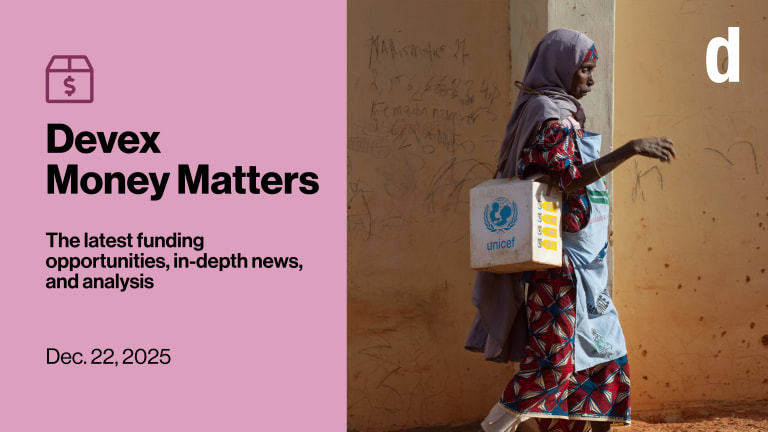
As world leaders gather in Ethiopia this week to discuss financing for global development, the policy landscape looks markedly different than that of the last such summit.
There will be more optimism about the prospects for the world’s poor, as well as calls for action on several fronts — in particular, the role of the private sector — that few would have predicted a decade ago.
The good news is that despite the financial meltdown of the mid-2000s, emerging markets as a bloc have continued to post growth rates that roughly double those of advanced economies. Millions of poor have been lifted into lives of more opportunity and hope.
Private sector capital flowing into the developing world, through foreign direct investment and portfolio flows (stocks and bonds), has come to consistently exceed official development assistance for the developing world as a whole.
Yet private capital is not the answer to every problem. It tends to favor large countries and markets, and it tends to go into sectors, such as mining, finance and manufacturing, much earlier than basic needs sectors, such as health, education, water and infrastructure.
As a result, the United States will go to Addis Ababa with several objectives related to harnessing the role of private capital for greater progress in development.
First, developing nations need to harvest more tax revenue from their economic growth. This will help them build more effective tax systems for the long term and better care for the social and economic needs of their citizens.
Second, private investment needs to be incentivized to go where it will have an even greater development impact: ventures that empower women and sectors, such as energy, infrastructure, health and education. And investors, from advanced and developing nations alike, need to ensure that it meets international best practices that safeguard the environment and protect the most vulnerable.
The U.S. development finance institution Overseas Private Investment Corp., for example, has an $18 billion portfolio that fosters American investment in developing nations. OPIC’s mandate is to catalyze private sector investment for sustainable economic development: It can only provide financing when the benefits — economic, social and environmental — to host communities and nations are clear and quantifiable. That means higher-wage jobs, development of workers’ skills and access to innovative, efficient technology.
Third, pragmatic, data-driven approaches to development need to inform our investment strategies and decisions. It is not enough for the development community to know, for example, that off-grid power systems can be helpful to the impoverished in rural areas. We need to know which types of off-grid systems are the most helpful.
Perhaps the most important, overarching goal will be to continue using the full extent of America’s global reach in development, the depth and sophistication of our financial system, and the ingenuity of our firms. Large pension funds and endowments in the U.S., for example, are increasingly looking for long-term fixed-income investments with returns higher than those available in advanced economies. Developing nations, meanwhile, are looking for capital to finance their long-term infrastructure projects. The U.S. can play a catalytic role in matching those types of investors and projects in ways that also benefit U.S. companies and workers.
In recent years, there has been an unprecedented groundswell of interest in using “impact investment” — from small entrepreneurial startups to social investment bonds — to address problems that governments have found challenging. As a result, we are seeing scores of new business models in developing countries, such as solar-generated power services that allow small, pay-as-you-go purchases via cellphones, or ATM-like terminals that dispense clean water in communities with potable water and sanitation shortages.
America’s entrepreneurial spirit, technological ingenuity, economic scale and unwavering commitment to development will serve our nation well as cross-border investment into emerging markets grows and business becomes an even greater force for good in development.
For all this potential, however, we should take care to be pragmatic in our approach and measured in setting expectations.
Today, there are some 60 million refugees across the world, most of them displaced by conflicts. That is more than at any time since World War II. The effects of climate change are believed to be occurring faster than predicted 10 or 15 years ago. As urbanization reaches unprecedented levels, 18 of the top 20 water-stressed cities are in developing nations.
Sustaining official development assistance in the face of these challenges is crucial. And private capital can be a powerful complement to aid, by helping it shoulder part of the demands. Having investors, entrepreneurs and a government who are all willing to continually experiment, innovate and scale up development solutions using private capital is an essential and growing part of the development equation.
Devex is in Addis to give you the inside track on #Fin4Dev. Check out our running blog and follow @Devex, @richard_devex and @AlterIgoe to get the latest news and developments from #FFD3.
Read more on our coverage of the #FFD3:
► The future of development finance: Live from Addis
► The new landscape of global development
► As #FFD3 kicks off in Addis, civil society raises red flags








